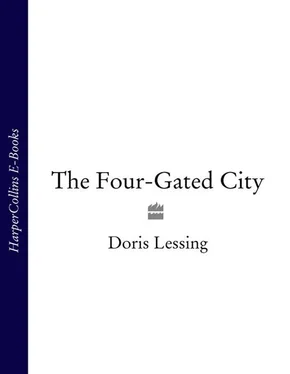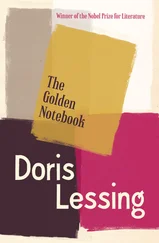Paul was put on the train at the village station fifty miles away, and was met by Mark. When Paul got out of the car, a pale, spiky, black-eyed waif, he was already in the uniform of a progressive school – jeans and sweater. He came into the drawing-room where Lynda sat, like a visitor in her pale fur coat, smoking and guarding her little box of pills.
She studied Paul, for a while, while he wriggled about in a chair opposite her. Then she smiled at him, her wide, beautiful smile. He, slowly, smiled back, a rather tentative offering. Slowly he approached Lynda, sidled around her, then tried to climb on her lap. But she held him off.
‘I don’t like being touched,’ she said. ‘But you can sit here.’ She indicated the patch of sofa beside her. He sat close, snuggling, as he would have done with his mother. But Lynda, at the touch, shrank from him. He felt it, and moved away, examining her face as a guide to how far he must go. Side by side they sat, a space between them.
Martha and Mark were busy with tea things. This ought probably not to happen at all. But then nothing of this ought to be happening.
‘Why don’t you like being touched?’
‘Because I’m ill.’
‘My mother liked it.’
‘But I’m not like your mother.’ ‘She’s dead.’
‘She killed herself,’ said Lynda. ‘Why did she?’
‘Some people don’t like living.’ ‘Didn’t she like me?’ ‘Very much,’ said Lynda.
‘I don’t think she liked me. Or she wouldn’t have killed herself.’
‘That doesn’t follow.’ ‘Yes it does.’
Lynda had moved where she sat, so that she was looking at Paul with a direct, cool smile. And he was leaning forward, gazing up into her truth-telling face.
‘Didn’t my daddy like living?’
‘You say that because you think he is dead.’
‘Yes, he’s dead.’
‘No, I don’t think he’s dead.’
‘He is! He is! I know he is!’
Tears were imminent, but Lynda made no attempt to stop them. ‘No. Perhaps he is, but we don’t think so. And he may come back.’
‘He won’t come back, because he doesn’t like me.’
‘You are making yourself much too important,’ said the sick woman to the desperate child. ‘Your daddy had work to do. It was important. If he went away it wasn’t because of you and your mother.’
‘Did my mother kill herself because he went away?’ ‘No. He went away and she killed herself – the two things at the same time.’ ‘How did she kill herself?’ ‘She made herself stop breathing.’ ‘Could I?’
‘Yes, if you wanted to.’ ‘Do you want to?’ ‘Sometimes.’ ‘Are you going to?’ ‘No.’
‘Why aren’t you?’
‘Because every time I think I will, then I decide to stay alive and see what happens next. It is interesting.’
He gave a scared laugh, and snuggled closer. His hand, meeting hers, felt hers go away. He put his two hands carefully on his knees.
‘At the school, the other children have mothers and fathers for the holidays.’ ‘Well, you haven’t.’ ‘Why haven’t I?’ ‘I’ve told you.’
They observed that his face had gone red, and his mouth was pinched up.
Lynda slapped him. ‘Stop it. You don’t die by holding your breath.’ ‘I shall if I want.’
‘Anyway, it’s silly. You’re unhappy now. But later you might be happy, who knows?’ ‘Am I unhappy?’ ‘Yes, you’re very unhappy.’ ‘I don’t want to be.’ ‘I dare say. But you are.’
She smiled, and got up. At the tea-tray she took a cup of tea, and sugared it. She went towards the door, with the cup. ‘Why are you going? Can I come too?’ ‘No. I can’t be with people for long. I’m ill, you see.’ ‘What sort of ill?’
And now a bad, twisted moment, a jar. ‘I have to be careful. I have to be on guard,’ she said, ‘so that’s why I’m ill.’ He had rushed to her, stood near, looking up. She bent down and widened her eyes at him, smiling secretly, straight into his face: ‘I know things, you see. They don’t like it.’
He looked afraid, shrank. The small boy stood, pathetic, staring up at the tall woman. And she felt that she had made a mistake. Her smile faded. She looked sick and anxious.
But he needed her too badly to be afraid of her. Before she got out of the door, he was after her. Careful not to touch, he stood as close as he could get.
‘Lynda. Lynda. Are you my mother now?’
‘No. You have no mother.’
‘Are you Francis’s mother?’
‘Yes. No. I suppose so. Not really. I’m not much good at being that kind of person. Some people aren’t.’
He drooped away, his finger in his mouth.
‘But, Paul, I’m your friend. Do you want that?’
He nodded, merely, not looking at her. Then he gave her a scared glance, and saw her wonderful smile. He smiled, slowly.
She went to her room. Later that day, Paul went to her, was admitted. He was there for about half an hour. They did not know what was said, or felt; but Paul was cheerful through his supper, and he asked Mark to tell him a story. When that was over, he said he would like to go back to the school next morning.
Mark took him back in the car. When he arrived back at the house he found Lynda establishing herself in the basement.
He telephoned the hospital.
Mark said to her: ‘They say you’ve made a remarkable recovery.’
He was watching Lynda and Martha arrange the bed for Lynda. What he was really saying was: You still might get quite better and be my wife again.
But Lynda smiled at him and said: ‘What awful fools they are. What fools! Well, thank God, they are.’ She laughed, was scornful. She continued to smile, scornfully, during the evening, but muttered once or twice: ‘But I must be careful though.’
She did not feel able to stay alone in the basement. Martha moved down, and slept in the living-room for a couple of nights. But then Dorothy, Lynda’s friend, came to live with her. She was a Mrs Quentin, but it seemed that her husband was living with another woman somewhere in Ireland. She was a large, dark, slow-moving woman, anxiously watchful of the impression she might be giving, with a tendency to make jocular remarks. She had a large quantity of jackdaw possessions, which she set out all over the flat before even unpacking her clothes. She was not the person either Mark or Martha could associate easily with Lynda.
But Lynda was pleased to have her there, did not mind the embroidered velvet hearts, the magazine covers tacked to the walls, the dolls; did not mind her friend’s possessiveness. It seemed that she liked Dorothy telling her to do this, and to do that; liked it when Dorothy said to Mark: ‘I think it’s time Lynda went to bed now.’
Mark did not like it. There was a moment when Lynda, being ordered to take her pills by Dorothy, looked across at Mark’s hostile face and openly laughed. It was in a kind of triumph.
Lynda wanted Dorothy here as a protection against Mark, against having to be Mark’s wife.
When Mark, or Martha, descending to the basement to offer help, or their company, the two women became a defensive unit, which excluded everybody. They exchanged private jokes, and made references to the hospital. There was something about them of two schoolgirls engaged in a world-hating friendship.
In short, having Lynda back in the basement, with a friend who had money and would pay some rent, would make a difference to the finances of the household; but not to much else.
The bad time had been going on for – but one of the qualities of a bad time is that it seems endless. Certainly everything that happened, the events, had long ago ceased to stand out as unpleasant incidents, or harbingers. The texture of life was all heaviness, nastiness, fear. When Martha tried to put her mind back into places, times, when things had been normal (but what did she mean by that?) she could not. Her memory was imprisoned by now. And when she tried to look forward, because after all, this was going to change, since everything changed, she could see nothing ahead but a worsening. The poisoned river would plunge down, yes, explode over a fall of rocks – but not into any quiet place. There was probably going to be war again. Yet that she could think like this at all meant she had learned nothing at all from the war so recently finished. A war was going on, at that moment, in yet another place no one had heard of before there was a war. Korea. A nasty war. If she were a Korean she would not now be saying: there is going to be a war. And if she were in America – well, from there England would seem all sun and sanity. In America she would have certainly lost her job, would probably be in prison. She would be wanting to emigrate, that is, if she could get a passport, which was doubtful. To a liberal country like England. Which so many Americans were finding such a refuge.
Читать дальше












